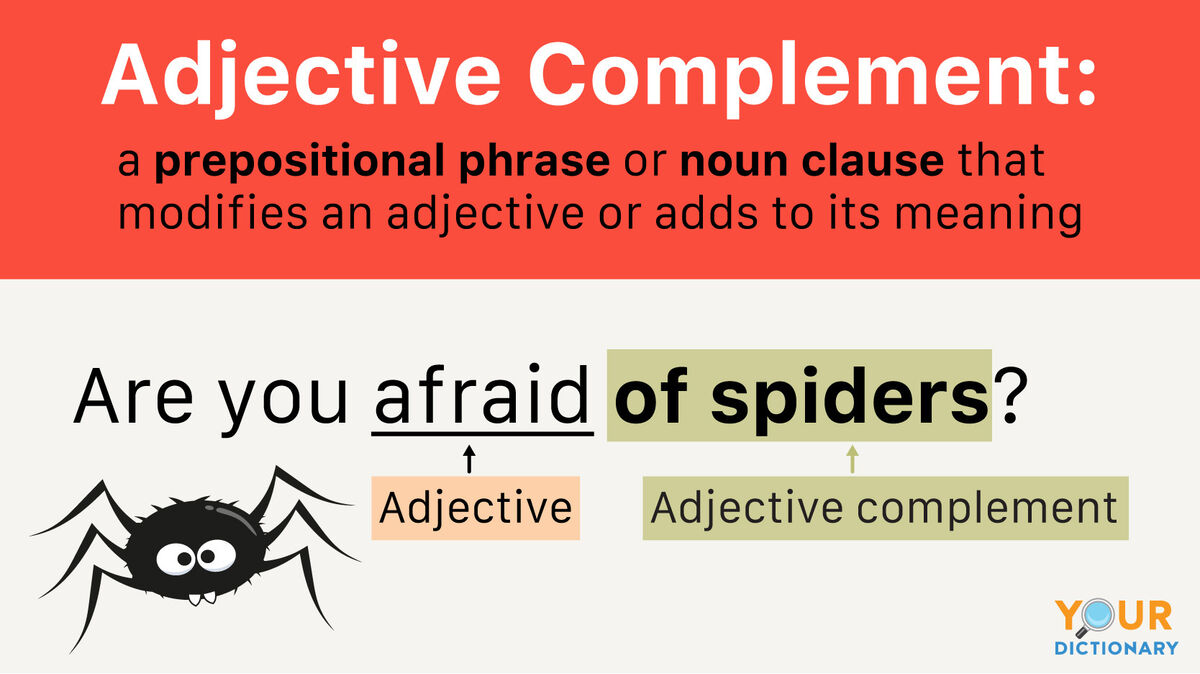
You know what an adjective is, but what is an adjective complement? Simply put, it’s a clause or phrase that modifies an adjective or adds to its meaning. An adjective complement can be a noun clause or a prepositional phrase.
What Is an Adjective Complement?
Adjective complements are an important aspect of English grammar. An adjective complement (also called an adjective phrase complement) is defined as a functional part of a sentence that completes the meaning of, or complements, an adjective or adjective phrase.
Adjective complements provide information that makes a word or group of words function as an adjective in a clause or sentence. They are usually paired with predicative adjectives, which are adjectives that come after a linking verb and describe the subject. If the meaning of an adjective is unclear as written, then an adjective complement is needed.
- If a sentence reads, "Barb is nervous," it conveys the idea that Barb is someone who tends to be nervous all the time.
- The word "nervous" is a predicate adjective because it is placed after a linking verb (is) and describes the subject (Barb).
- If the author or speaker isn't trying to say that Barb has a general trait of nervousness, then more information is needed to complete the meaning.
- The predicate adjective "nervous" can be clarified with the addition of an adjective complement.
- The sentence "Barb is nervous about public speaking" specifies the situation in which she is nervous.
- The addition of the adjective complement "about public speaking" completes the meaning of the adjective in this sentence.
Adjective complements can take the form of a noun clause or a prepositional phrase.
Adjective Complement as a Noun Clause
A noun clause is simply two or more words that function as a noun. It should have a subject and a verb, and, since it takes the place of a noun, it’s a dependent clause and cannot stand alone. A noun clause starts with the words “that," “how,” “if,” and the wh- words “what,” “when,” “why,” "who," and "where."
Examples of noun clauses include:
- when you arrived
- that he is happy
- where Sara went
Adjective Complement as a Prepositional Phrase
A prepositional phrase starts with a preposition — such as “with,” “about,” “on,” or “in” — and is followed by a noun, pronoun, noun phrase, pronoun phrase, or noun clause.
Examples of prepositional phrases include:
- with the car
- under the bridge
- after the show
Examples of Adjective Complements
The best way to understand an adjective complement is to see it in action. An adjectival complement always follows the adjective it complements. In other words, the adjective will always precede its complement. In the example sentences below, the adjective complement is bold and the adjective it modifies (completes) is underlined. The type of adjective complement is specified in parentheses.
- She was unsure how her parents would react. (noun clause)
- My boss was anxious when sales fell. (noun clause)
- I was delighted that she was chosen. (noun clause)
- I am curious what color you picked. (noun clause)
- I will be happy when I pass this class. (noun clause)
- I am very surprised about the nomination. (prepositional phrase)
- The little boy was eager for Christmas to arrive. (prepositional phrase)
- Are you afraid of spiders? (prepositional phrase)
- We were shocked by the news. (prepositional phrase)
- It was wrong of her to leave. (prepositional phrase)
Are these making sense? Deepen your understanding of this aspect of English grammar by reviewing even more adjective complement examples.
Other Types of Complements
Adjectives are popular parts of speech, but you also have subjects, verbs, adverbs, direct objects, and more. So, you may not be surprised to learn there are also other types of complements in grammar. Three other common types are: subject complements, object complements and verb complements. In the example sentences below, each complement is bold and the part of the sentence it modifies is underlined.
- subject complement - A subject complement is one or more words that act as an adjective or noun and modifies or refers to the subject of the sentence. It follows a linking verb, such as is, are, was, become, seems, tasted, smells, or feels. (Whales are beautiful.)
- object complement - An object complement is one or more words that act as an adjective or noun and modifies or refers to the direct object of the sentence. An object complement follows the direct object in a sentence. (Tracy dyed her hair pink.)
- verb complement - Like adjective clauses, verb complements are phrases or clauses. They act as objects of other verbs, either directly or indirectly. They may include infinitives (She wanted him to go). Gerunds can act as verb complements (I considered leaving the Army), as can noun clauses (He insisted that he pay the check).
An Added Detail
Don’t let these technical terms deter you from one central theme. An adjective complement enhances an adjective in order to provide further detail. That’s all there is to it! One of the simplest examples above was, “I will be happy when I get married.” What’s the adjective in that sentence? Happy. Why is this person happy? Because they are getting married. Be sure to make use of these clauses and phrases in your writing whenever they apply; they’re fantastic methods of elaboration. Now that you know how to use adjective complements, start adding some more descriptive adjectives to your vocabulary.